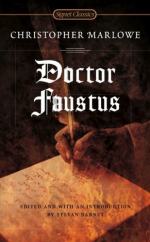|
This section contains 6,041 words (approx. 21 pages at 300 words per page) |

|
SOURCE: "Doctor Faustus: Master of Self-Delusion," in Heavenly Necromancers: The Magician in English Renaissance Drama, University of Missouri Press, 1984. Reprinted in Christopher Marlowe's "Doctor Faustus," edited by Harold Bloom, Chelsea House, 1988, pp. 77-92.
In the following excerpt, Traister explores the historical and literary associations of magic in Doctor Faustus. She concludes that the imagery of magic undercuts the humanistic message of the play and results in a very pessimistic view of humankind's ability to effectively deal with forbidden knowledge.
Ambiguity and irony—key words in almost every discussion of Faustus—are frequently used to explain the play's various dichotomies. For underlying almost all explication of Faustus is a sense that the play's words and actions do not match: Faustus's rhetoric and his deeds are incommensurate, and the play's beginning and end frame a number of prosaic and dull scenes in which Faustus seems totally unlike the scholar of...
|
This section contains 6,041 words (approx. 21 pages at 300 words per page) |

|


